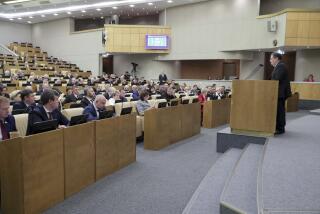Gorbachev Says Defense Cut Will Aid Economy
- Share via
MOSCOW — Soviet President Mikhail S. Gorbachev, sounding defensive about his program of reforms, has said he favors cutbacks in military spending as a way of solving the country’s persistent economic problems, according to a speech made public Sunday.
In the lengthy address to intellectuals, writers and artists, Gorbachev spoke about the problems besetting the reform program, called perestroika or “restructuring.” But he insisted that he has lost none of his determination to press ahead with the undertaking.
Gorbachev spoke to the group Friday, but the text of the speech was not made public until Sunday, when it was published across four pages in the Communist party newspaper Pravda. Observers here noted that it was also intellectuals and writers to whom Gorbachev aired his original ideas for perestroika , even before they were submitted to the Communist Party.
Goods in Short Supply
The Kremlin leadership has been besieged recently by complaints from ordinary citizens that supplies of food and other consumer goods, always in short supply in this country, are now even harder to find than they were under such earlier Soviet leaders as Leonid I. Brezhnev.
“I don’t believe workers will renounce perestroika ,” Gorbachev said at one point, “just because an item is missing from the shops.”
Responding to the complaints, Gorbachev argued that consumption has increased in the past two or three years, suggesting that the supply of goods had increased. But then Gorbachev said: “Naturally you all have the same question: Where is it (and) why do we still have long lines in shops and shortages of many vital goods are not diminishing?”
He said the problem is one of financial liquidity and had not arisen overnight with the adoption of the reform program.
Budget Deficit Cited
“The gravest heritage that we received from the past was the budget deficit, which had been laboriously concealed from the public but existed nonetheless,” Gorbachev said. In an echo of themes being sounded in the United States, Gorbachev added, “The deficit has a pernicious effect on the entire national economy.”
One of the causes of the deficit, he said, was a decline in oil exports in the years 1985-88 amounting to 37 billion rubles, approximately $61 billion at current rate of exchange.
Also in the same period, sales of alcohol declined by 49 billion rubles, about $81 billion. Consumption of vodka and other liquor was condemned by Gorbachev when he came to power, but the authorities late last year reversed themselves and began making alcohol available again in large quantities.
Gorbachev also mentioned catastrophes at the nuclear power station in Chernobyl in 1986 and the Armenian earthquake in December as added reasons for a large budget deficit, which has been projected at 36 billion rubles, or about $59 billion.
Afghan War a Drain
Although he gave no figures, Gorbachev indicated also that another drain on the treasury was the war in Afghanistan, which the Soviets invaded nearly a decade ago and are now hoping to leave next month. “What’s the use of trying to conceal it,” Gorbachev said, “we are suffering big losses in connection with Afghanistan.”
Gorbachev said the immediate solution lies in taking radical steps to cut expenses, especially in defense and capital investment, “big outlays which have no direct bearing on the social needs of the people.”
“The issue is so acute we will be forced to take a hard look at our defense spending,” Gorbachev added. “A preliminary study shows that we can reduce . . . without lowering the level of security and defense potential of the state.”
The Soviet leader gave no indication of how deep the cuts will be, but last month, in a speech to the United Nations, Gorbachev said he had made a decision to unilaterally cut the Soviet armed forces by 500,000 men over two years, including a reduction of 10,000 tanks, 8,500 guns and 800 combat aircraft.
In Paris on Sunday, Foreign Minister Eduard A. Shevardnadze went even further, saying the country’s stockpile of chemical weapons will be destroyed in coming months. A Soviet official last week admitted that the maintenance of chemical weapons had cost the nation billions of rubles needlessly.
The Soviet defense budget is officially given as about $32 billion, but Western defense analysts believe that figure represents only about 20% of the real cost of defense outlays.
Gorbachev also hinted in the speech that opposition to perestroika has now taken on political connotations, a suggestion that grumbling is now part of an organized opposition.
More to Read
Sign up for Essential California
The most important California stories and recommendations in your inbox every morning.
You may occasionally receive promotional content from the Los Angeles Times.










